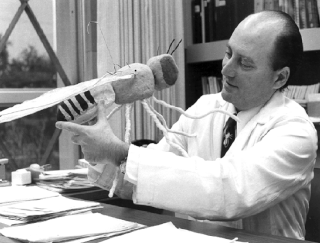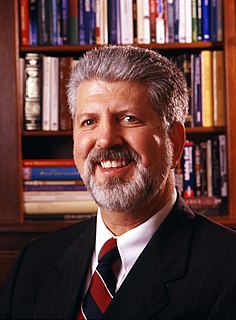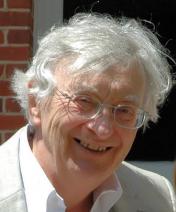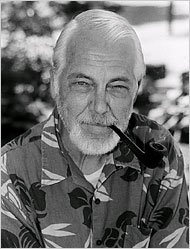 W
WHans van Abeelen was the first Dutch behaviour geneticist. He obtained his M.Sc from the University of Groningen and his Ph.D. from the Catholic University of Nijmegen in 1965, where he stayed for the rest of his career as "wetenschappelijk hoofdmedewerker". He was a founding member of the Behavior Genetics Association and was a member-at-large of its Executive Committee from 1984 till 1987. He also served on the editorial board of its journal, Behavior Genetics, from its creation in 1971 to 1992. Van Abeelen took early retirement in 1991, but nevertheless became one of the founding members of the International Behavioural and Neural Genetics Society. Over the span of his career, he published 64 articles and book chapters and edited a book, The Genetics of Behaviour, which was an early overview of European behaviour genetics.
 W
WSeymour Benzer was an American physicist, molecular biologist and behavioral geneticist. His career began during the molecular biology revolution of the 1950s, and he eventually rose to prominence in the fields of molecular and behavioral genetics. He led a productive genetics research lab both at Purdue University and as the James G. Boswell Professor of Neuroscience, Emeritus, at the California Institute of Technology.
 W
WDorret I. Boomsma is a Dutch biological psychologist specializing in genetics and twin studies.
 W
WClaude Robert Cloninger is an American psychiatrist and geneticist noted for his research on the biological, psychological, social, and spiritual foundation of both mental health and mental illness. He holds the Wallace Renard Professorship of Psychiatry, is professor of psychology and genetics, and serves as director of the Sansone Family Center for Well-Being at Washington University in St. Louis. Cloninger is a member of the evolutionary, neuroscience, and statistical genetics programs of the Division of Biology and Biomedical Sciences at Washington University, and is recognized as an expert clinician in the treatment of general psychopathology, substance dependence, and personality disorders. As of 2019, he has since resigned these roles with Washington University and taken a position as a private practitioner with PALM Health in St. Louis, Missouri functioning as a psychiatrist, geneticist, psychotherapist, and practicing psychological clinician at the innovative multidimensional medical practice there.
 W
WJacqueline N. Crawley is an American behavioral neuroscientist and an expert on rodent behavioral analysis. Since July 2012, she is the Robert E. Chason Chair in Translational Research at the University of California, Davis School of Medicine and the UC Davis MIND Institute. Previously, from 1983–2012, she was chief of the Laboratory of Behavioral Neuroscience in the intramural program of the National Institute of Mental Health. Her translational research program focuses on testing hypotheses about the genetic causes of autism spectrum disorders and discovering treatments for the diagnostic symptoms of autism, using mouse models. She has published more than 260 peer-reviewed articles in scientific journals and over 100 review articles and book chapters. According to the Web of Science, her works have been cited over 16,000 times, giving her an h-index of 72. She has co-edited 4 books and is the author of What's Wrong With my Mouse, which was very well received.
 W
WWim E. Crusio is a Dutch behavioral neurogeneticist and a directeur de recherche with the French National Centre for Scientific Research in Talence, France.
 W
WJohn C. DeFries is one of the world's leading behavior geneticists. His achievements include being President of the Behavior Genetics Association (1982–1983) and cofounder of the journal Behavior Genetics, as well as its co-editor (1970–1978). His awards include The Dobzhansky Award for Outstanding Research in Behavior Genetics, Consulting Editor of the Journal of Learning Disabilities (1987–2002), Fellowships in the International Academy for Research in Learning Disabilities, Association for Psychological Science, and the American Association for the Advancement of Science, Section J (Psychology).
 W
WLindon J. Eaves is a behavior geneticist who has published on topics as diverse as the heritability of religion and psychopathology. His research encompasses the development of mathematical models reflecting competing theories of the causes and familial transmission of human human differences, the design of studies for the resolution, analytical methods for parameter estimation and hypothesis-testing and application to substantive questions about specific (human) traits. He was the first to consider standardized variance components for heritability estimates and was the first to consider the effects of living with a relative on the behavior of a person. Furthermore, he was the first to think about genotype x age interaction and set up the algebra to study the effects of genes working in males as well as females, making it possible to use twins pairs of opposite-sex. Together with Nick Martin, he wrote many classical papers, one of which is "The genetic analysis of covariance structure". They also wrote the book, Genes, culture and personality: An empirical approach. In 2012, a Festschrift was held in Edinburgh dedicated to Eaves' work; the proceedings were subsequently published in Behavior Genetics.
 W
WDavid William Fulker was a British behavioural geneticist at the University of Colorado's Institute for Behavioral Genetics. Among positions of esteem, he was elected president of the Behavior Genetics Association (1982), and was executive editor of the society's journal Behavior Genetics. In honour of this role, the society maintains an annual Fulker Award, for the best paper in the journal each year, and for which the award is "$1000 and a decent bottle of wine".
 W
WMike Galsworthy is the co-founder of Scientists for EU and Healthier IN and a media commentator about the effects of Brexit on the scientific community in the United Kingdom. He is currently a visiting researcher at the London School of Hygiene and Tropical Medicine (LSHTM) and was previously Senior Research Associate in the Department of Applied Health Research, University College London (UCL).
 W
WRobert T. Gerlai is a Canadian behaviour geneticist. He obtained his PhD in 1987 from the Eötvös Loránd University and the Hungarian Academy of Sciences in Budapest. He has worked in the biotechnology (Genentech) and biopharmaceutical research industries as senior scientist and executive as well as at different universities. Currently, he is a Distinguished professor of psychology at the Department of Psychology at the University of Toronto. The Web of Science lists over 300 peer-reviewed publications for him, which have been cited over 12000 times, resulting in an h-index of 55. Gerlai has worked with several different animal species, including paradise fish and mice. He has been using zebrafish in his research for the past 20 years, and studies the effects of alcohol on brain function and behaviour, including social behaviour, fear-anxiety, and learning and memory.
 W
WIrving Isadore Gottesman was an American professor of psychology who devoted most of his career to the study of the genetics of schizophrenia. He wrote 17 books and more than 290 other publications, mostly on schizophrenia and behavioral genetics, and created the first academic program on behavioral genetics in the United States. He won awards such as the Hofheimer Prize for Research, the highest award from the American Psychiatric Association for psychiatric research. Lastly, Gottesman was a professor in the psychology department at the University of Minnesota, where he received his Ph.D.
 W
WJohn Clinton Loehlin was an American behavior geneticist, computer scientist, and psychologist. Loehlin served as president of the Behavior Genetics Association and of the Society for Multivariate Experimental Psychology. He was an ISIR lifetime achievement awardee.
 W
WDavid Thoreson Lykken was a behavioral geneticist and Professor Emeritus of Psychology and Psychiatry at the University of Minnesota. He is best known for his work on twin studies and lie detection.
 W
WGerald (Jerry) McClearn was an American behavior geneticist and professor emeritus of health and human development and biobehavioral health at the Pennsylvania State University.
 W
WPaul Everett Meehl was an American clinical psychologist, Hathaway and Regents' Professor of Psychology at the University of Minnesota, and past president of the American Psychological Association. A Review of General Psychology survey, published in 2002, ranked Meehl as the 74th most cited psychologist of the 20th century, in a tie with Eleanor J. Gibson. Throughout his nearly 60-year career, Meehl made seminal contributions to psychology, including empirical studies and theoretical accounts of construct validity, schizophrenia etiology, psychological assessment, behavioral prediction, and philosophy of science.
 W
WRobert J. Plomin, FBA is an American psychologist and geneticist best known for his work in twin studies and behavior genetics. A Review of General Psychology survey, published in 2002, ranked Plomin as the 71st most cited psychologist of the 20th century. He is the author of several books on genetics and psychology.
 W
WDanielle Posthuma is a Dutch behavior and psychiatric geneticist who specializes in statistical genetics. She is a University Research Chair professor at VU University Amsterdam, where she is also head of the Department of Complex Trait Genetics. She has been a member of the Young Academy of the Royal Dutch Academy of Sciences since 2005. She is known for studying the genetics of psychiatric and cognitive traits, including schizophrenia, neuroticism, Alzheimer's disease, insomnia, as well as genetics of intelligence, which she first became interested in researching in the 1990s. In 2019 Posthuma became a member of the Royal Netherlands Academy of Arts and Sciences.
 W
WDavid C. Rowe was an American psychology professor known for his work studying genetic and environmental influences on adolescent onset behaviors such as delinquency and smoking.
 W
WCarmen Sandi is a Spanish and Swiss behavioral neuroscientist. She is a professor of neuroscience and director of the Laboratory of Behavioral Genetics at the Brain Mind Institute.
 W
WJohn Paul Scott was an American behavior geneticist and comparative psychologist known for his research into the development of social behavior, which he pursued through studies in animal models including the dog. Scott & his collaborator John L. Fuller are memorialised in the Fuller-Scott prize, offered annually by the Behavior Genetics Association.
 W
WEric Nathan Turkheimer is the Hugh Scott Hamilton Professor of psychology at the University of Virginia.